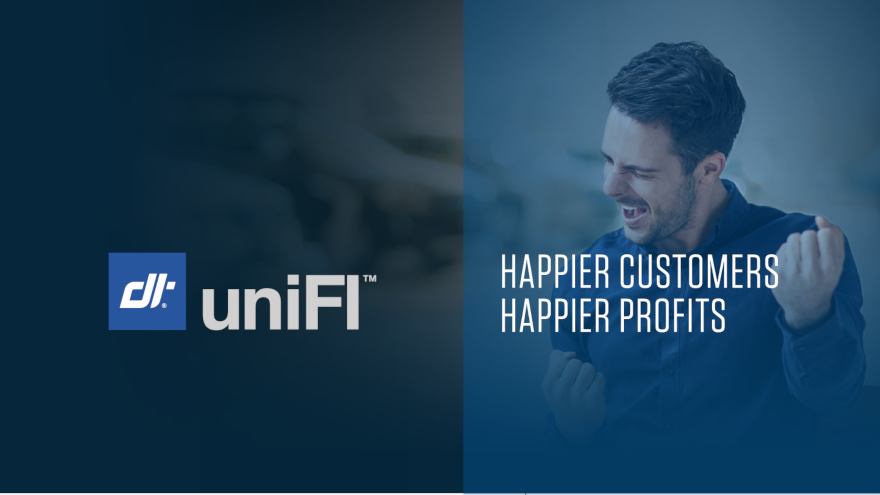Strategic sessions and honoring its best performers highlighted the latest event hosted by EFG Companies.
The company recently held its annual Agent Council when agents from across the U.S. gather to discuss industry trends, current business challenges, best practices and new product innovation.
Going into 2020, the company highlighted that agents are primarily focused on helping dealers compete in an industry where profit margins continue to tighten and fortify their customer retention models.
“As we’ve seen over the last few years, agents are evaluating how to restructure their agencies to better serve their dealer clients and support a larger dealer book of business,” said Adam Ouart, vice president of agency services at EFG Companies.
“It’s become clear that the true differentiator for agents is transparency, partnership and engagement,” Ouart continued in a news release. “However, creating a business culture around these values takes more than a pep talk. We’re seeing agents invest heavily in training for their own teams, as well as training for their dealership partners.”
As agents implement policy and process improvements, EFG acknowledged they are also working with dealerships to improve their own service models, especially in the service drive. This includes training service managers on both customer service and sales, recognizing the fact that a service manager has a much bigger opportunity to close more customers on small, credit-card-sized F&I products tailored to specific individual needs.
In addition to discussing the path forward, EFG also recognized two agents for their demonstrated success in 2019.
Empire Dealer Services was given the Top Agent Award. This award is determined by overall performance, effective training, and comprehensive achievements throughout the year.
Heart Dealer Services was recognized with the EFG Rising Star Award. This award was created to recognize the achievements of those agents who made the largest strides when it comes to improving their value proposition with their dealer clients.
Hosted annually, EFG’s national Agent Council is designed to provide a collaborative environment in which agents can formalize their strategies to better serve their dealer clients, improve F&I performance, and increase dealer profit. This year, EFG’s premier agents from across the United States attended a four-day roundtable in the Bahamas.
Fueled in part by blossoming relationships with industry players such as CarGurus, Westlake Technology Holdings recently announced that it reached $10 billion in assets under management milestone ahead of its targeted goal of hitting the milestone in 2022.
Westlake responded by setting a new goal of $20 billion in assets. When does the company want to reach that target? Leadership said in a news release that it’s looking to secure that tally by 2026.
“In 2012, we set the ambitious goal of reaching $10 billion by 2022, and we were able to accomplish this milestone earlier than expected,” Westlake Technology Holdings Group president Ian Anderson said in that news release.
“Our next step is to reach $20 billion in assets by 2026 using the same aggressive market growth our company has implemented,” Anderson continued.
As Anderson referenced, Westlake explained that it achieved its $10 billion goal through strong organic growth with independent and franchised dealers and the creation of new companies and divisions. Those new entities include Westlake Flooring Services in 2012, Westlake Portfolio Management in 2018 and Westlake Capital Finance in 2019.
Westlake also grew through the acquisition of existing companies — Western Funding in 2013 and Credit Union Leasing of America in 2017.
Westlake Financial’s indirect lending portfolio represents approximately 70% of the portfolio with assets worth more than $7.01 billion from more than 660,000 accounts. Westlake’s other subsidiaries make up the remaining 30%:
• Credit Union Leasing of America: $2.75 billion
• Westlake Flooring Services: $193.5 million
• Western Funding: $146.3 million
• Wilshire Consumer Credit: $51.7 million
• Westlake Portfolio Management: $22 million
“Westlake’s employees are an amazing team that embraced our shared vision,” vice chairman Bret Hankey added. “Surpassing $10 billion is an incredible accomplishment. I have full confidence we will hit our new goal of $20 billion.”
As experts from ALG and Kelley Blue Book watched average transaction prices (ATP) for new models climb again in October, Edmunds noticed average interest rates for new-vehicle financing remained below 6% for the fourth month in a row.
Edmunds pegged the average APR on new financed vehicles at 5.7% in October; the same reading as September and down from 6.2% in October of last year.
Meanwhile, the average APR for used-vehicle financing edged slightly lower in October, according to Edmunds, ticking down to 8.4% from 8.7% year earlier.
Edmunds experts say new-vehicle shoppers found much better financing offers this year compared to last October, when interest rates spiked above 6% and stayed there through the first six months of 2019.
“Car shoppers got to take advantage of some decent financing offers as automakers continued their model-year sell-down efforts in October,” said Jessica Caldwell, Edmunds’ executive director of industry analysis.
“Auto loan interest rates still aren’t as low as they were a few years ago, but it’s good news for shoppers that rates appear to be reaching a point of relative stability,” Caldwell continued in a news release.
Edmunds experts noted that the Fed rate cut at the end of the month happened too late to do much for October sales, but could help ease financing conditions for vehicle shoppers through the rest of 2019.
“The end of the calendar year is a popular time for expensive vehicle purchases,” Caldwell said. “Shoppers in the market for a large truck or SUV, or a new luxury vehicle, can look forward to taking advantage of lower financing rates as a bit of an early holiday gift.”
The valuation analysts at Kelley Blue Book reported the estimated average transaction price for a light vehicle in the United States came in at $38,259 in October. KBB calculated new-vehicle prices increased $1,064 (up 2.9%) from October of last year, while decreasing $141 (down 0.4%) from last month.
“Average transaction prices were generally favorable for most automakers, as the industry average climbed 3% year-over-year, partially due to the shifting sales mix from cars to trucks and SUVs,” Kelley Blue Book analyst Tim Fleming said in a news release.
“However, car prices did grow by 2% in October 2019, their biggest improvement in nearly a year,” Fleming continued.
KBB added Manufacturers are focusing incentive programs on the increasingly competitive utility segments, helping make those vehicles more affordable to consumers. Analysts said trucks have shown the most strength of any segment with full-size trucks up 3%, while mid-size trucks rose 6%, aided by new and redesigned models.
And over at ALG, a subsidiary of TrueCar, analysts there projected average transaction prices to be up 2.6% from a year ago and 0.2% from September to reach $35,239.
“With the economy remaining resilient, consumers have not been afraid to opt into premium trims and luxury models leading to higher average transaction prices,” ALG chief economist Oliver Strauss said in a news release. “With incentives up year-over-year, consumers are getting some help to offset the higher transaction prices.”
ALG shared four other additional insights in its latest update, including:
• Honda and Nissan are the only automakers expected to be down on ATP year over year, 2.9% and 1.1%, respectively. Meanwhile BMW is expected to be up 7.1%.
• ALG projects that U.S. revenue from new vehicle sales will reach $47 billion for the month of October 2019, up 1.5% or $717 million from a year ago and 5.5% from last month.
• The ratio of incentive spend to ATP is expected to be 10.7%, up 2% from a year ago but down 5.4% from September 2019.
• In ALG’s Retail Health Index (RHI), which measures automaker brand health, Hyundai and Kia stood out for mainstream brands and BMW and Mercedes stood out for luxury brands due to a mix of strong retail sales and lower incentive spend utilized to drive retail volume.
“The broader shift in consumer preference from cars to SUVs is leading to a notable spike in BMW’s average transaction price, fueled by exciting new or redesigned SUV products in the X5 and X7,” ALG chief industry analyst Eric Lyman said.
“BMW’s strong Retail Health Index performance shows the brand is holding steady with consumers and that they’ve be able to drive volume at higher price points, all while lowering incentives,” he continued.
Added Lyman, “We expect Honda’s drop in average transaction price to be due to an increase in retail share for the Civic, which overtook the Accord as Honda’s best-selling sedan over the last few years and continues to capture share made available by competitors in the segment overall.”
New-Car Finance Data
|
|
October 2019
|
October 2018
|
October 2014
|
|
Term
|
69.7
|
69.1
|
67.0
|
|
Monthly Payment
|
$565
|
$542
|
$486
|
|
Amount Financed
|
$33,238
|
$31,200
|
$28,480
|
|
APR
|
5.7
|
6.2
|
4.4
|
|
Down Payment
|
$4,123
|
$4,063
|
$3,492
|
|
Average Transaction Price
|
$37,886
|
$36,542
|
$33,001
|
Used-Car Finance Data
|
|
October 2019
|
October 2018
|
October 2014
|
|
Term
|
67.5
|
67.0
|
65.5
|
|
Monthly Payment
|
$418
|
$405
|
$370
|
|
Amount Financed
|
$22,661
|
$21,735
|
$20,017
|
|
APR
|
8.4
|
8.7
|
7.8
|
|
Down Payment
|
$2,638
|
$2,615
|
$2,143
|
Source: Edmunds
While enhancements in auto financing certainly have been made over the years, a pair of surveys orchestrated by Inovatec Systems Corp., revealed areas where improvements still could be made for the benefit of finance companies and consumers.
This week, Inovatec began with the results from its latest survey that touched on consumer pain points associated with finance companies when financing a vehicle.
When asked about the biggest complaint associated with financing their last vehicle, 56.8% of consumers said that finding a bank or finance company that would approve the purchase of the vehicle was their biggest complaint.
An additional 37.8% of those respondents said there were too many steps involved, and 30.6% said the processing time was their biggest complaint.
In a separate survey, Inovatec recapped that finance companies were asked to identify issues and challenges with their current processes in their organization. More than 35.6% of participants reported operational issues were a struggle, while 28.1% reported issues in lack of efficiency.
“The findings show a clear discrepancy between lender processing systems and customer needs,” Inovatec said in a news release. “Consumers today desire quick outcomes, yet also expect personalized customer experience.
“Companies are searching for (artificial intelligence) tools that allow them to increase customer satisfaction through digital retailing,” the company continued.
Furthermore, consumers were also asked what factors would make the buying process easier in the future. More than 62.2% said that quicker, more simplified processes were top of mind.
Another 29.7% of consumers reported that in-real-time access to updates on the status of their application would simplify the process, and 24.3% said that access to pre-qualification tools would improve their experience.
When consumers were asked about their level of understanding on the terms of their loan, Inovatec found that only 34% reported they fully understood their financing contract. Meanwhile, 66% of consumers reported they either do not understand the terms of their loan at all, or somewhat understand but do not know every detail.
Bryan Smith, head of consumer growth and partnerships at Inovatec, emphasized this particular statistic should be concerning to finance companies, specifically as the misunderstanding of contract terms can significantly affect default.
“The survey shows a clear divide between lender process system efficiency and customer needs that affect the overall customer experience,” Smith said. “Lenders need access to updated systems that integrate artificial intelligence to improve their processes, which has a trickle-down effect to customers over time.”
Toyota Motor Credit Corp. (TMCC) said it made a complex financing move that the captive said was “demonstrating the company’s commitment to innovation and advancing its reputation as an industry leader.”
On Thursday, TMCC announced that it issued its first secured overnight financing rate (SOFR) medium-term note (MTN) transaction. The company indicated the one-year U.S. dollar-denominated issuance settled on Tuesday and raised $1.55 billion from institutional investors.
The development represents the company’s first SOFR-linked MTN transaction in the U.S. dollar market, and the first time a captive has issued a floating-rate MTN based on SOFR. Officials pointed out the London Interbank Offered Rate (LIBOR) is scheduled to discontinue after 2021, and many companies are looking to SOFR as an alternative reference rate to price U.S. dollar loans and derivatives.
Cindy Wang, group vice president of treasury for Toyota Financial Services — the finance and insurance brand for Toyota in the United States — explained the importance of the company’s SOFR issuance.
“Our broader corporate liquidity strategy is to ensure that we maintain the ability to fund assets and repay liabilities in a timely and cost-effective manner, even in adverse market conditions. This transaction supports our strategy by further diversifying our financing structures, and places us at the forefront of companies preparing for the discontinuation of the LIBOR index,” Wang said in a news release.
“We’re pleased that the offering was met with enthusiasm from large investors seeking exposure to SOFR. This strong demand allowed TMCC to upsize the deal significantly from its initial target," Wang added. “We appreciate the support from our investors and banking partners in making this SOFR issuance such a success.”
TMCC reiterated that it has long demonstrated the ability to pursue innovative funding solutions. The company previously offered diversity and inclusion bonds, what it believes was the auto industry’s first-ever green bond and a SOFR floating-rate commercial paper transaction to the short-term capital markets.
For more information on TFS’ capital markets programs, visit www.toyotafinancial.com.
Wolters Kluwer is quickly approaching a dozen awards collected so far this year for its solutions to help finance companies.
According to an announcement distributed this week, Wolters Kluwer’s Lien Solutions has earned two 2019 Golden Bridge Awards for superior product innovations developed for the benefit of its clients in the financial services industry. Lien Solutions was honored with a 2019 Golden Bridge Gold Award for its Portfolio Sync solution and a Bronze Award for its iLien Motor Vehicle solution.
The coveted annual Golden Bridge Awards program encompasses the world’s best in organizational performance, innovations, products and services, and customer programs from every major industry in the world. Lien Solutions was awarded its two 2019 Golden Bridge Awards based on its innovation in the following categories:
— Best IT Software, Portfolio Sync (Gold): This lien automated management solution was designed for clients who utilize multiple methods to submit Uniform Commercial Code (UCC) filings. Portfolio Sync can combine these clients’ existing iLien filings with public records data into one consolidated view. This capability can provide greater visibility into a finance company’s portfolio and identifies potential “gaps” or issues that may require remedial action in order to maintain and protect a lender’s security interests.
— Best IT Software Innovation, iLien Motor Vehicle (Bronze): iLien Motor Vehicle can deliver a single point of management for processing and managing motor vehicle titles. The tool can help automate, streamline and connect finance companies’ organizational workflows, improving the vehicle titling process and the ongoing management of vehicle titles. The solution can save time and reduce the likelihood of costly vehicle title rejections. Supported by Lien Solutions’ extensive experience in commercial lending, the solution can bring major benefits to those operating in the motor vehicle lien market.
“It’s no secret that for a business to achieve continued success, it must continuously look for innovative solutions that introduce new products and enhancements to the market in which it serves,” said Raja Sengupta, executive vice president and general manager of Wolters Kluwer’s Lien Solutions, which has garnered 11 industry awards so far in 2019.
“The development of our Portfolio Sync and iLien Motor Vehicle solutions perfectly embodies the spirit of creative invention that everyone at Lien Solutions has,” Sengupta continued. “That spirit of our team is what leads to these industry recognitions and, more importantly, helps our clients and their customers thrive. Simply put, innovation is part of our DNA.”
Dealership F&I staff who showcase products from autopom now can use a sales strategy that includes a hypothetical about being covered when the vehicle experiences problems at an inopportune time.
The California-based company now offers vehicle protection plans that include roadside assistance and nationwide breakdown coverage. Roadside assistance services from autopom and its providers are designed to ensure drivers have a vehicle backup and a mechanic’s assistance if a breakdown leaves them stranded or interrupts their scheduled plans.
“We call this automotive peace of mind,” autopom president and chief executive officer Mike Jones said in a news release. “We never want drivers to worry when they’re on their way to work, to school, or on vacation.”
Vehicle protection plans with roadside assistance and breakdown coverage from autopom start at $1,488 for California drivers who have an Asian or domestic model. Coverage starts around $2,500 in other states nationwide. Some offerings include added benefits, like interest-free payment plans.
To learn more about vehicle protection plans from autopom, go to extended-vehicle-warranty.com or call (800) 724.8141.
The final segment of Dealertrack uniFI now is available after the company’s revamped technology solution first arrived nearly a year ago.
This week, Dealertrack announced the launch of Digital Contracting on Dealertrack uniFI, putting the final piece in place to complete its single platform that can connect the entire deal workflow process from leads to contracts for the company’s network of approximately 22,000 dealers and more than 1,600 finance companies.
According to recent data from Dealertrack, one out of every four paper deals results in delayed funding due to missing or incorrect information. With Digital Contracting on Dealertrack uniFI, dealers can reduce data re-entry and ensure documentation is complete and error-free before it is submitted, helping eliminate re-contracting and speeding up funding from an average five days to as fast as the same day.
“Dealertrack uniFI combines as many as 51 different pieces of paperwork from the car deal process into a single online deal jacket, simplifying the car-buying journey for customers and adding efficiency to submission to lenders,” said Firas Makhlouf, chief information officer of Driver’s Village, a dealer group based in Cicero, N.Y., that has franchised stores connected to 21 brands.
“By integrating Digital Contracting into this powerful platform, we can now complete the full end-to-end car-buying process without the need to jump between multiple screens and technologies to get a single deal done,” Makhlouf continued in a news release.
In the past, Dealertrack acknowledged many dealers and finance companies have wavered from adopting digital contracting due to misconceptions such as heightened costs, workflow disruption and a perceived lack of critical mass utilization by all parties.
However, the company insisted that the reality today is that digital contracting is connecting more dealers and finance companies than ever before, making contracting easier and more efficient while also saving time and money by cutting out printing and shipping.
“Dealers and lenders alike recognize the exponential benefits of electronically managing contracts in transit to improve dealer-lender communication, increase operational efficiency and create a better consumer car shopping experience,” said Cheryl Miller, senior vice president and general manager of Dealertrack F&I and Titling Solutions.
“Digital Contracting on Dealertrack uniFI is challenging the status quo by giving dealers and lenders the ability to reduce handling errors and secure more deals and loan originations while better meeting the needs of today’s consumer,” Miller went on to say.
The Digital Contracting functionality on Dealertrack uniFI adds a host of new enhancements to the platform, including:
• One deal jacket: An end-to-end workflow from leads to contracts with all funding documents in a single location, including Aftermarket contracts.
• Real-time error display: Data entry validation rules run in real-time, showing in-line errors and alerts to the dealer for quick rectification and greater accuracy prior to contract submission.
• Live funding checklist: A dynamically growing, digital list of up-to-date lender-required documents as a particular deal is being finalized — and the status of each of those documents.
• Point of sale ancillary documents capture: Dealers can now snap and upload high quality stips and trailing document images with their tablets any time, up to the point of funding.
• Multiple device support: Engage customers on any device, anywhere in the showroom for a paperless digital review of contracts and an easier signing process — no paper required.
• Local paper out: If a digital contract ever needs to be converted to paper, it can now be done independently and on-demand by the dealer, with no fees attached.
“From creating a lead and penciling a deal to submitting for approvals and digital contracting, Dealertrack uniFI provides an all-in-one service designed with the end-user in mind,” said Will Pollard, finance manager of Tim Short Chevrolet, which has three rooftops in Kentucky.
“With Digital Contracting on Dealertrack uniFI, we are now seeing funding within minutes of submission, reducing customer wait times and freeing up cash for us to invest in new stock to drive more sales,” Pollard went on to say.
Digital Contracting on Dealertrack uniFI is available in all 50 states.
For more information about Digital Contracting on Dealertrack uniFI, visit Go.dealertrack.com/goDigital.
Dealerships wanting to expand their operations now can turn to Westlake Technology Holdings.
The finance company that originates installment contracts throughout the credit spectrum recently launched Westlake Capital Finance to provide commercial real estate loans to dealers.
The commercial real estate program from Westlake Capital Finance offers dealers the ability to purchase their current dealership (lease buyout), purchase additional or new locations or fund new construction of dealership facilities.
“Our goal is to service the needs of our dealerships on all levels,” group president Ian Anderson said in a news release. “Whether it’s financing their customers, inventory purchases, portfolio acquisitions or commercial real estate acquisitions, Westlake’s goal is to be the ‘one-stop shop’ for dealers’ financing needs.”
Westlake Capital Finance is a direct lender that can provides commercial real estate loans on most asset classes to fund uses such as ground-up construction, renovation/value-add opportunities and turnkey purchases.
“This is an exciting new division for the company,” director of commercial real estate lending Lauren Barnard said. “We look forward to providing much-needed financing solutions to auto dealers nationwide, helping them get the leverage they need to grow their businesses more than ever.”
Dealerships interested in learning more about the Westlake Capital Finance’s commercial real estate loan program can call (888) 682-0166.
The auto-finance industry went to two of the most readily accessible tools it has to complete new-vehicle deliveries in September as transaction prices for new metal continue to stretch buyers’ purchasing capabilities.
As J.D. Power spotted incentives climbing to within $28 of an all-time high, Edmunds indicated the average interest rate for a new-vehicle retail installment contract fell for the sixth month in a row and stayed below 6% for the third month in a row in September.
Edmunds reported the annual percentage rate (APR) on new financed vehicles averaged 5.7% in September, compared to 5.8% in September of last year.
“Automakers are in full sell-down mode, which means that car shoppers got to take advantage of some decent promotional offers in September,” Edmunds’ executive director of industry analysis Jessica Caldwell said in a news release. “The cost of purchasing a new vehicle is still a lot higher than it was a few years ago, so it’s a positive sign that automakers and dealers are making the right moves to keep buyers coming back into the fold.”
Meanwhile, J.D. Power explained what might seem like the right moves are coming with a cost as analysts noticed record levels of spending.
Incentive spending is projected to reach $4,159 (up 6% or $246), the highest level ever for the third quarter, according to J.D. Power, and just $28 short of the all-time quarter high set in Q4 2017. Analysts explained the increase is being driven by the ongoing sell-down of old model-year vehicles, which account for more than 90% of sales in the quarter and represents the slowest sell-down on record.
J.D. Power also mentioned transaction prices are expected to set another record for the quarter, with the average new-vehicle sales price projected to reach $33,321, up 4% or $1,229 from last year. The average price for cars is up 4% to $26,736 and trucks/SUVs are up 3% to $35,725.
Analysts said continued growth in prices combined with flat retail sales, means that consumers are expected to spend a record $120.7 billion on new vehicles in Q3. J.D. Power noted this development represents the highest level for any quarter, edging out the previous high set in Q4 2018 by more than $500 million.
Kelley Blue Book also chimed in on the subject as its analysts reported the estimated average transaction price for a light vehicle in the United States was $37,590 in September. KBB computed new-vehicle prices increased $262 or 0.6% from September 2018, while increasing $215 0.7% from the previous month.
“Transaction prices are still strong, but the growth has almost stalled, as retail demand is weakening,” Kelley Blue Book analyst Tim Fleming said. “Despite automakers pulling back their production this year, it may not be fast enough.
“Incentives are rising, averaging about 10.5% of average transaction prices and nearing levels from 2017 when industry sales saw their first decline since the recession. SUVs and trucks are still performing well, as recent model launches are pushing sales and average prices up. This is even better news in that these units are usually more profitable for automakers,” Fleming continued.
Although average interest rates on new-vehicle financing have seen a decline in recent months, Edmunds experts said this drop is driven by incentives and is not indicative of a return to post-recession market conditions.
“Shoppers who are thinking about buying a new car may want to take advantage of the model-year sell-down over the next couple of months before the majority of these incentives dry up,” Caldwell said.
So how might the rest of 2019 unfold? Thomas King, senior vice president of the data and analytics division at J.D. Power, offered these figures and thoughts.
King’s data showed the average interest rate on a finance deal has fallen to 5.5% in Q3, more than 60 basis points lower than the first quarter this year. For a $30,000 vehicle with a 60-month loan, King computed these components equate to reduction in payment of nearly $10.
“The big questions for the industry are how quickly manufacturers can transition to the new model year and will we see a return to the incentive discipline observed in Q1 and Q2,” King said.
“As manufacturers clear their inventories of heavily discounted 2019 model year vehicles, lower discounts on new 2020 model year vehicles could result in a slower sales pace than we saw this quarter,” he went on to say.
New-Car Finance Data
|
|
September 2019
|
September 2018
|
September 2014
|
|
Term
|
69.7
|
68.7
|
67.0
|
|
Monthly Payment
|
$559
|
$537
|
$478
|
|
Amount Financed
|
$32,928
|
$31,062
|
$28,120
|
|
APR
|
5.7
|
5.8
|
4.2
|
|
Down Payment
|
$4,050
|
$4,198
|
$3,367
|
|
Average Transaction Price
|
$37,051
|
$36,369
|
$32,606
|
Used-Car Finance Data
|
|
September 2019
|
September 2018
|
September 2014
|
|
Term
|
67.5
|
66.9
|
65.5
|
|
Monthly Payment
|
$416
|
$401
|
$371
|
|
Amount Financed
|
$22,623
|
$21,697
|
$20,090
|
|
APR
|
8.4
|
8.4
|
7.7
|
|
Down Payment
|
$2,660
|
$2,657
|
$2,164
|
Source: Edmunds












